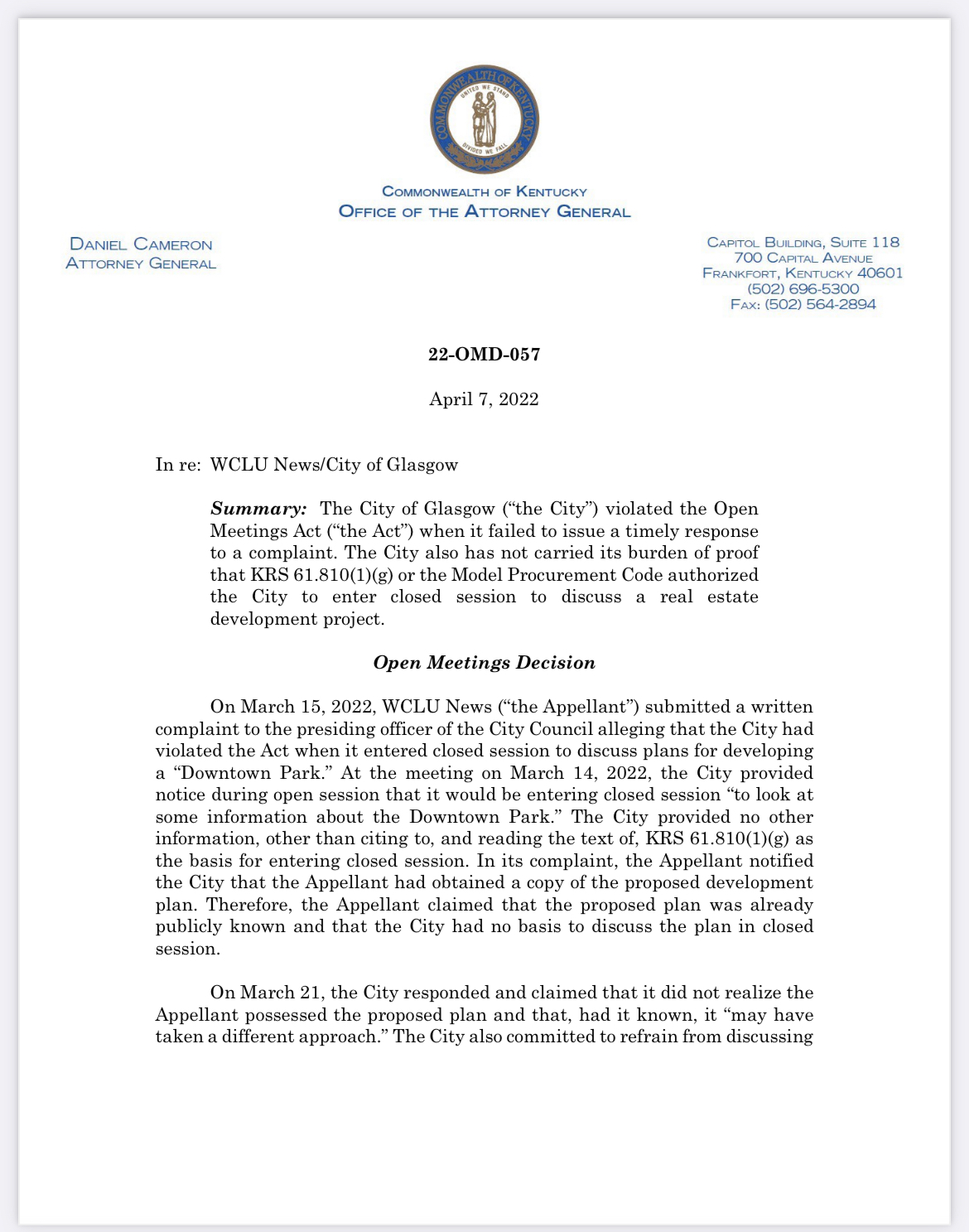
Imagine that you are attending a public meeting of a public agency involving an issue of vital importance to your community. Imagine, further, that the meeting convenes, roll call is taken, minutes of the last meeting are approved, and the public agency members immediately go into closed session without explanation. Imagine, finally, that the members emerge from the closed session after several hours and immediately adjourn. Later, you learn that the public agency took action on the issue of vital importance to your community in closed session.
This is a scenario that could legally unfold across the Commonwealth under a new decision issued by the Kentucky Attorney General on April 7.
In an open meetings dispute involving the Glasgow City Council and WCLU news director Brennan Crain, the Attorney General reversed four decades of interpretation reconciling KRS 61.815(1) – which establishes the requirements public agencies must observe before going into closed session, limits the topics public agencies can discuss in closed session, and prohibits public agencies from taking final action in closed sessions – with KRS 61.815(2), which ostensibly creates the exception that swallows the rule.
KRS 61.815(1) is the statute that prompted the Kentucky Supreme Court to affirm, in 1997, “that prior to going into an executive session, the public body must state the specific exception contained in the statute which is relied upon in order to permit a secret session. There must be specific and complete notification in the open meeting of any and all topics which are to be discussed during the closed meeting. The specific reason given for a closed session must be the only topic of discussion while the Board convenes in such a secret session.”
It is the statute that the Supreme Court reaffirmed in 2012 -- in voiding a contract illegally negotiated in closed session --prompting the Court to declare that the agency’s conflicting “interpretation is fundamentally at odds with the purpose and spirit of the Open Meetings Act. ‘[T]he formation of public policy is public business and may not be conducted in secret ... [T]he people of this Commonwealth do not yield their sovereignty to the agencies which serve them ... [but] insist on remaining informed so they may retain control over the instruments they have created.’”
Ignoring these foundational tenets of open government law, the Attorney General ruled in Crain’s favor on the question of the illegality of the topic discussed in closed session, but unceremoniously announced a seismic shift in the decades’ oldinterpretation of the statute governing closed sessions of public agencies.
Cameron dismissed scores of open meetings decisions -- dating back to at least 1980 -- in which a series of attorneys general “wrestled with an interpretation of KRS 61.815(2) that does not entirely defeat the purpose and intent of KRS 61.815(1).” In that 1980 opinion, the Attorney General reasoned:
“Taken literally KRS 61.815(2) excludes from any formality concerning going into a closed session every exception listed in KRS 61.810 except (b) [acquisition or sale of real property] and (f) [discipline or dismissal] as it relates to students. Such a literal interpretation would mean that an agency could go into closed session without any of the formalities set forth in KRS 61.815 under the other [soon to be fourteen] exceptions listed. However, we do not believe that the literal interpretation comports with the legislative intent.
“When a public agency which is generally required to hold open meetings finds it necessary to go into a closed session to deal with a particular excepted subject matter, the spirit of the Open Meetings Law and the concern of the public is best served by observing the steps set forth in KRS 61.815. For such an agency to go into closed session without first giving notice in open session of the general nature of the business to be discussed and without first passing a motion in open session, would create doubt in the minds of members of the public as to whether the Open Meetings Law was being properly observed and could, in fact, lead to laxity in observing the law.”
More importantly, Cameron dismissed without comment the referenced Supreme Court opinions issued as recently as 2012 – which are grounded in the interpretation that compliance with KRS 61.815(1) is a precondition to conducting a closed session -- in favor of an interpretation that appears in a single aberrant Supreme Court opinion, Cunningham v. Whalen.
With due respect, the Cunningham litigants failed to argue prior caselaw and the Court failed to address, much less overrule, that caselaw. Cunningham has since been limited to the narrow factual context in which it arises: settlement discussions in pending litigation. To the extent it deviates from the overwhelming weight of legal authority, Cunningham disserves the public’s right to know.
So the next time you attend a public meeting to observe the discussion of an issue of vital importance to your community, don’t be surprised if the public agency members retire to closed session without explanation and return some time later without explanation. Don’t be surprised if you later learn that action was taken on that issue of vital importance to your community in closed session. If you are interested in ascertaining what the members discussed, your only recourse is a legal challenge to that closed session.
And, rest assured, Danial Cameron has no problem with this scenario.
It appears we narrowly escaped another major insult to the open records law in the soon to be concluded 2022 legislative session only to be dealt a death blow to the open meetings law in Cameron’s April 7 open meetings decision.


